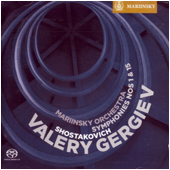
ESSENTIAL RECORDINGS

A brand new label launched only four months ago in May 2009, with already 3 recordings in its catalogue. The inaugural release was a wonderful recording of
the satirical opera 'The Nose' by Shostakovich, which is already a best-seller. The Mariinsky Theatre, which used to be known as The Kirov during the Communist era,
originated way back in 1783 and is now into its 227th season and boasts an impressive history including premiere performances of operas and ballets from Verdi and
Tchaikovsky up to new composers like Smelkov. In 2006, they opened a new state of the art concert hall with impressive acoustics, where most of their recordings will take place.
This new recording, their second release, is an impressive account of Dmitri Shostakovich's first and last symphonies. Although a span of 46 years separates
the two works, they both share an uncanny balance of light-hearted moments and deeply emotional passages, with bold strands of ultra-typical Shostakovich genius.
Valery Gergiev and this orchestra have music like this in their DNA and it transpires in every page of the score of these performances. The Largo movement of the First
symphony for example in this recording really gives us a vivid image of who Shostakovich is about to become with its use of the trumpet as a lonely voice sounding out
an omen of what lies ahead. The percussion section of the orchestra have a field day in the closing Allegro when again Shostakovich uses different percussion instruments
to accentuate the thematic material at hand, and of course his use of the piano as an integral part of the fabric, which again was put to great effect in his 5th symphony.
If the First symphony spoke of things to come, the Fifteenth speaks of a life gone by and all of it revealed in music until the end. When the Adagio comes to an emotional boil
around the 9:20 mark, these musicians reveal Shostakovich's turmoiled soul brilliantly. This enigmatic symphony speaks more quietly than most, but then Shostakovich does not
need to pound his fist anymore to put his message across, it lies in each and every note, and Gergiev delivers a reading in which each and every line is well defined.
The slow and methodical build up to the 8:45 climax of the final movement is superbly done here, and in the closing moments, with again Shostakovich using a myriad of
percussion effects to echo the whole work and resolve the puzzle, the essence of that life is revealed.
Jean-Yves Duperron
This is a notable release for two reasons. It is the second recording produced by the Mariinsky Theatre on its in-house label with essential Shostakovich
repertory never recorded when Gergiev was under contract to Philips. Also, it is the first occasion of a head-on collision between this conductor and the other
Russian podium maverick, Moscow-based Mikhail Pletnev. Appearing only months apart, both tackle the Shostakovich 15. Both albums are offered as Hybrid SACDs (Pletnevís for Pentatone).
The main work has been controversial since its first performance in 1972. With extensive quotations from Rossini, Beethoven and Wagner (all, mind you, re-orchestrated at each appearance in
the score) plus much self-quotation, the composerís intentions have been widely misunderstood. The Fifteenth is, in fact, a testament on a lifetime of experience. Recorded versions abound
but only two conductors, the composerís son Maxim (Collins and Supraphon) and Kurt Sanderling (Berlin Classics and BPO Centennial) ever seem to have realized its full measure on disc.
How does the man of the theatre, Gergiev, stack up to virtuoso pianist and orchestra builder Pletnev? Both can claim performances in the M Shostakovich/Sanderling league. In direct
comparison it is a dead heat. Pletnev achieves greater cohesion while Gergiev has an advantage in spontaneity. The couplings may influence a choice. Gergiev conducts a thrilling account of
the First Symphony while Pletnev opted for a selection from the incidental music to the 1931 stage play, Hamlet. Why not go for both?
Stephen Habington